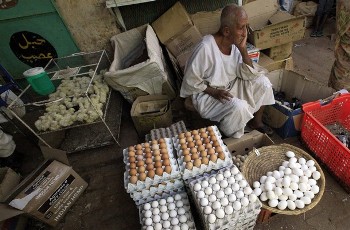Sudan hails success of economic tripartite program
September 21, 2014 (KHARTOUM) – Sudan’s finance minister, Badr al-Din Mahmoud, has praised the country’s economic tripartite program, saying if it was not for its implementation in 2011 the inflation rate would have risen to 156%.
 According to government figures, inflation in Sudan decreased slightly in August to 46.4% compared to 46.8% in July. However the annual inflation rate increased through July, from 45.3% in June and 42% for the month of May.
According to government figures, inflation in Sudan decreased slightly in August to 46.4% compared to 46.8% in July. However the annual inflation rate increased through July, from 45.3% in June and 42% for the month of May.
The minister of Finance said that the upcoming five-year program covering 2015-2019 comes to enhance the success of tripartite program which expires this year. He noted that the tripartite program managed to achieve a positive GDP growth at 1.4% and 4.4% in the years 2012 and 2013 respectively despite negative projections at the time due to the global financial crisis and the secession of South Sudan in mid-2011.
Nonetheless, he acknowledged that the balance of trade was adversely impacted which reflected on the exchange rate and inflation.
Mahmoud, who was speaking before the state finance ministers on Sunday, said that the main goals of the five-year program will be to sustain economic stability by reducing inflation, stabilising exchange rate, achieving positive growth rates, ensuring that budget deficit remains within safe limits and improving tax collection besides expanding the tax umbrella without resorting to tax increases.
The minister added that the program will focus on the productive sector with a follow up mechanism as well as development of agriculture and irrigation and adding new infrastructures for the sector beside paying attention to the transport sector with special focus on railway and river transport.
The government announced last August the implementation of the five-year program as an extension of the tripartite program, which included the partial lifting of subsidies in 2012 and 2013.
The curtailment of fuel subsidies last September almost doubled prices of gasoline and diesel, triggering some of the worst protests Sudan has seen in years.
The International Monetary Fund (IMF) at the time approved of Khartoum’s decision saying that fuel subsidies “disproportionately” benefit the rich, but called for “a new package of corrective measures”, including addressing fiscal imbalances and tax reforms.
Last month, the IMF maintained its projection that inflation “will continue its downward trend thus bringing consumer price inflation down to single digits”.
“Twelve-month inflation fell to 35.7 percent at end March, from 41.9 percent at end-December 2013, mainly reflecting lower food prices,” it said.
Sudan’s GDP is estimated to have grown at 2.7% in 2013 and projected to stand at 2.5% in 2014.
(ST)
